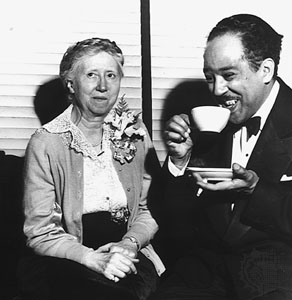 |
| Marianne Moore and Langston Hughes (www.everseradio.com) |
She is, as I need tell no one, among the most important American poets of the 20th century, a key figure in American Modernism and a correspondent of and peer to other figures from this era, including William Carlos Williams, Ezra Pound, and Wallace Stevens; a deft handler of syllabic and free verse; the winner of nearly every major US poetry prize of her day; and the mentor of many poets who came after, including Elizabeth Bishop and James Merrill. She even wrote liner notes for Muhammad Ali's album I Am the Greatest!. (At the risk of highlighting an aspect of her person that I have done with any other poet, I must mention her habitual outfit: a full black cape, with a tricorner hat. Those who know me know I aspire to be able to pull off the former, if not the latter.)
The following poem, "Poetry," is considered one of her best, and rightly so, in that it captures the esssence of her style and approach, her concerns as a poet, the movement of her mind, her particular mode of formal and metrical play, and the wit she deployed throughout her career. Her poems visually convey a feeling of fluidity which contrasts with her syllabic control, creating works of considerable complexity. Your eyes and ears are always moving through her poems at multiple speeds. Opening the poem with a disavowal, "I, too, dislike it," followed by the colloquialism "fiddle," is very Moore, but then she begins to delve more deeply into the fiddle, qualifying her appraisal, first through negation "with a perfect contempt for it," followed by an abstract commonplace, almost banal and sentimental in its simplicity, "a place for the genuine," that assumes complexity because of the prior qualifications. And then she proceeds from there.
Lastly I must note that this is the 1919 version of this poem, which appeared in Others for 1919: An Anthology of the New Verse. Founded by Alfred Kreymbourg in 1915, the Others anthologies appeared for 4 years, and published the work of many of the major figures from this period, including Moore, Williams, Stevens, T. S. Eliot, Mina Loy, Conrad Aiken, Carl Sandburg, Amy Lowell, Djuna Barnes, and Fenton Johnson. Moore subsequently revised and republished this poem over the next five decades, including an infamously radical 1967 truncation to just three lines (!), proving that even the greatest artists are not always the best judges of their work.
In the 1924 version, in addition to tinkering with the lineation, pruning away a few words (often a good thing) and changing others, so that "autocrats" becomes "poets," Moore felt the need to place her strange but apt poetic formulation "imaginary gardens with real toads in them" in quotes. This was not a direct quotation, though, but more like a signaling of her own discomfort with the line; yet where else in poetry (or literature, or art for that matter) can you find imaginary gardens with real toads? She was on to something powerful about the human imagination and language itself, as poetry always is.
POETRY
I, too, dislike it: there are things that are important
beyond all this fiddle.
Reading it, however, with a perfect contempt for it,
one discovers that there is in
it after all, a place for the genuine.
Hands that can grasp, eyes
that can dilate, hair that can rise
if it must, these things are important not be-
cause a
high sounding interpretation can be put upon them
but because they are
useful; when they become so derivative as to
become unintelligible, the
same thing may be said for all of us – that we
do not admire what
we cannot understand. The bat,
holding on upside down or in quest of some-
thing to
eat, elephants pushing, a wild horse taking a roll,
a tireless wolf under
a tree, the immovable critic twitching his skin like a
horse that feels a flea, the base-
ball fan, the statistician – case after case
could be cited did
one wish it; nor is it valid
to discriminate against "business documents
and
school-books"; all these phenomena are important.
One must make a distinction
however: when dragged into prominence by half
poets,
the result is not poetry,
nor till the autocrats among us can be
"literalists of
the imagination" – above
insolence and triviality and can present
for inspection, imaginary gardens with real toads
in them, shall we have
it. In the meantime, if you demand on one hand,
in defiance of their opinion –
the raw material of poetry in
all its rawness, and
that which is on the other hand,
genuine, then you are interested in poetry.









No comments:
Post a Comment